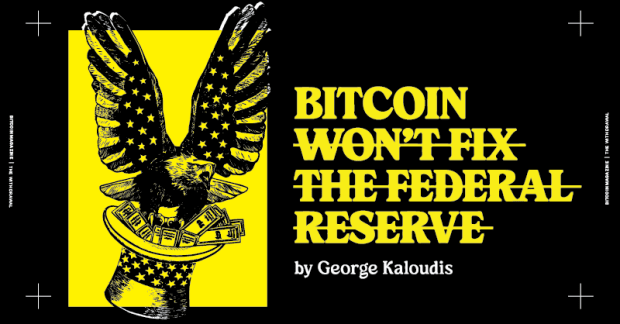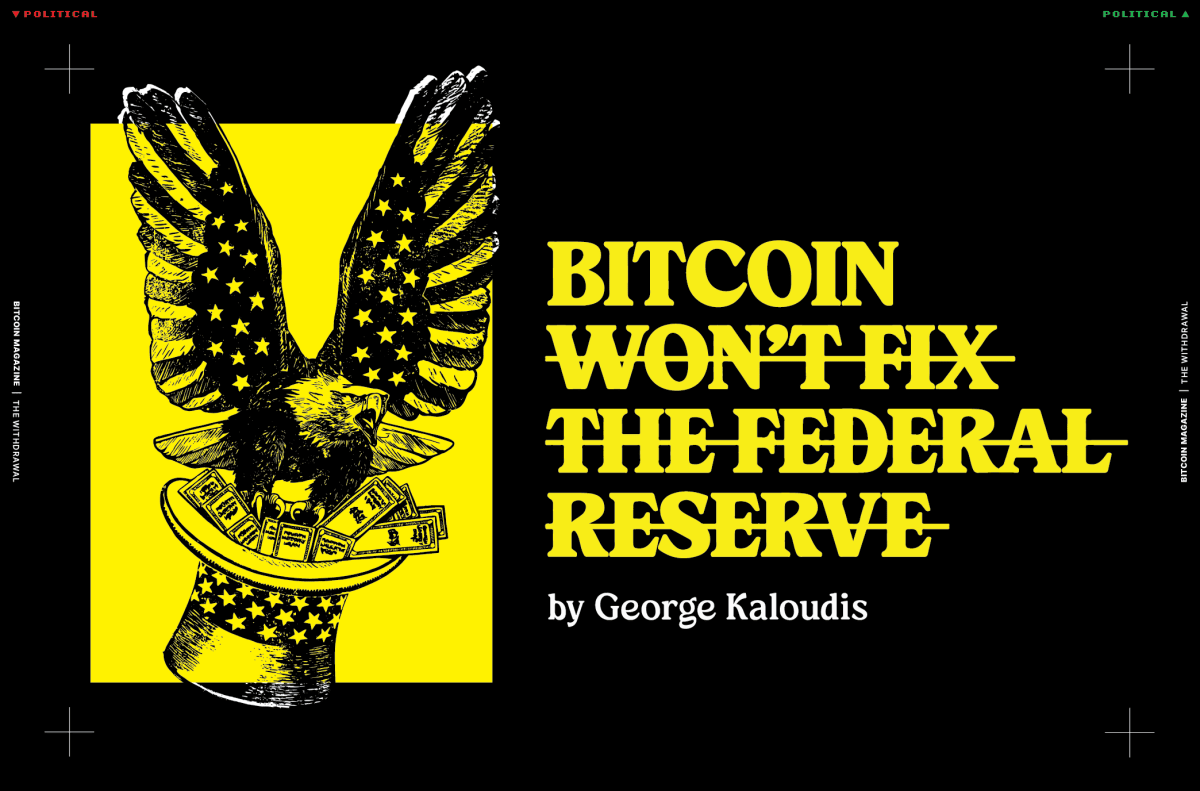Blogs & Articles: Bitcoin Won’t Fix The Federal Reserve 🔗 29 weeks ago

- Category: Blogs & Articles | Bitcoin Magazine: Bitcoin News, Articles, Charts, and Guides
- Author(s): George Kaloudis
- Published: 6th October 2023 17:00
This article is featured in Bitcoin Magazine’s“The Withdrawal Issue”. Click here to subscribe now.
A PDF pamphlet of this article is available for download.
You’re reading a print Bitcoin Magazine so you probably already like Bitcoin, which means you probably don’t like the title or premise of what you’re about to read, and so, you already hate it.
Alas, it is written and published.
The money has been the way it is now for some time and to be sure people have been saying: "Well, hold on a minute …" for probably that whole time. I wouldn't really know, I wasn't there, but there are enough Austrian economists who have been proselytizing sound money principles since before the Great Depression to suggest that at least someone was saying it.
Without going too in depth about gold as a monetary good, the United States went off the gold standard in 1971, and the U.S. dollar is no longer backed by gold (and it likely won’t ever be again). And in 1971, there were probably a bunch of angry and confused Americans who said: “Well, hold on a minute …” and then asked: “Say now, is this good?” and “Say now, what is money?” Then probably, quite naturally: “How does monetary policy even work?”
And who knows how many people had those questions answered in 1971, but it’s almost certainly at a rate lower than if the United States had gone off the gold standard for the first time in 2023.
For better and for worse, the flows of information and disinformation in the 21st century are many leagues beyond the information flows of any other century. In admitting this, we do not submit that we are better than people in the 1970s just because we can get an answer to any question from a search engine or order countless books to our doorsteps only for them to collect dust on our bookshelves after posting a picture on social media about receiving the book. Rather we submit something far simpler; even the most cursory question can be answered with minimal effort.
Being a generalist and understanding many things is easier now than ever.
That’s mostly good, but it of course comes with its own drawbacks. Cue the internet unintelligentsia who read one blog post about a topic to then claim expertise - hopping from hot technology topic to the next like a toad in a thunderstorm. And that’s not to say anything about the quality of the information flows.
 Click the image above to subscribe.
Click the image above to subscribe.
In thinking about these information flows, we can easily see that this doesn’t really have much to do with gold as a monetary good. Instead, it is about how the current availability of information is just that much more powerful for the individual as a tool to solve the problems we may have.
And now we have Bitcoin as a companion for those information flows.
Before 2022’s inflation crisis, the last time monetary and fiscal policy was a main character in the United States was in and around 2007’s Great Financial Crisis.
We had optimized search engines and online bookstores then just like we do now in 2023, so 2007 people could get their questions answered about monetary policy then, too. And so when interest rates were ratcheted down to zero and the Federal Reserve bailed out Bear Stears, AIG, the mortgage-backed securities market, and just about anything high finance touched, the then Federal Reserve chair Ben Bernacke’s credit-creation-branded quantitative easing likely had more educated critics than say Paul Volcker did in the 1970s and 1980s.
But even with those information flows, did we really predict what a zero-interest rate economy would look like? Did we predict one of the longest U.S. equity bull markets ever? Maybe some did, but it would have been hard to predict that we would have allowed outrageous companies to not only survive but to thrive, where burning operating cash flow was actually a good thing. For all its good in giving the masses tools, it was actually that same information flow machine that helped fuel this reality.
Think about it this way; internet and technology companies are supposed to benefit from large and powerful network effects to then eventually become incredibly valuable once they hit some sort of adoption tipping point or exit velocity. Some of these companies deserve it, some do not. Zero interest rates nurture an environment where you can have basically unlimited attempts at deserving it since exogenous capital is available so cheaply. While interest rates were low, funds, investors, and individuals with capital were starved for yield and thus were willing to take more risk or accept lower returns on their investments.
I won’t name names, but burning cash was better than actually making money in the eyes of many of these capital allocators. If you were making money, then you weren’t trying to grow, and if you weren’t trying to grow then you weren’t trying to maximize yield potential for investors. So if you weren’t burning cash, none of the brilliant private equity investors, venture capitalists, or growth equity funds gave you money. Maybe your stock price tanked and an activist investor had you and your entire board removed.
Nonetheless, Bernacke’s Federal Reserve seemed justified in the end. Inflation was basically low during and after the Great Recession and the economy did survive. But the resultant decade-and-a-half of zero percent interest rates was never supposed to be a thing. Rates were supposed to come back up when the economy was “ready”, but the U.S. decided the economy was never ready. Hence the rise of so-called zombie companies, which can only exist in the low cost of capital world perpetuated by zero interest rates.
Naturally, many posited it was these types of companies which would fail when interest rates increased again. But do you know what most people weren’t worried about when interest rates eventually increased and the cost of capital went up again at the end of 2022?
Yeah, that’s right. Banks. Credit Suisse? Please, be serious. It would have been mostly hyperbole to suggest that banks would be the businesses that failed once rates were increased after being low for so long. In fact, syndicated loans held by banks tend to have floating interest rates, so it could easily be suggested that outstanding loans held on the balance sheets of banks would actually yield more nominally as rates went up as the loans collected more interest.
Except – what ended up happening to some banks was quite literally the opposite. Banks held deposits, didn’t lend them out and instead exposed themselves to something called duration risk which would normally not be a problem unless interest rates were increased twenty-fold in the space of a year. That’s what caused banks to fail. If you were the person who called the series of events that got us from the failure of Lehman Brothers in 2007 to the failure of Silicon Valley Bank and First Republic Bank in 2023, then I’d love to see the receipts.
So here’s the silly thing about our intertwined, information-rich system: The Federal Reserve cut rates because banks failed which in turn caused banks to fail fifteen years later.
 Click the image above to download the PDF.
Click the image above to download the PDF.
The Federal Reserve will ignore Bitcoin. It has to.
This time around, we have Bitcoin. And so with our even better information flows in 2023 we can ask the all important question: Will Bitcoin adoption improve the monetary policy behaviors of the Federal Reserve?
I submit that it won’t.
I do not see the incentive for the Federal Reserve to give into anyone or anything, let alone Bitcoin. Be honest, Bitcoin is surely not big enough to be a threat to the U.S. dollar. The United States is far more concerned with U.S. dollar dominance being threatened by, say, the Chinese yuan. Bitcoin on its own has not destabilized anything.
But you know what would be destabilizing? The Federal Reserve conceding to bitcoin tenets and pointing to bitcoin as a reason for its monetary policy decisions. The Federal Reserve saying: “We’re doing this because of bitcoin” would be a self-fulfilling prophecy and make the Federal Reserve and the U.S. dollar immediately irrelevant. This is quite interesting because the Fed pointing at China as a reason for a monetary policy decision doesn’t do that.
It does the exact opposite.
It’s trivial. Of course the United States would defend its post as a capitalist economy to maintain U.S. dollar hegemony against China’s centrally planned economy and its yuan. Game theory and geopolitics suggests that it isn’t much of a leap for most Americans to admit that China is a credible economic threat to the United States. Defending against China doesn’t lend credibility to China because it is already a threat.
Bitcoin on the other hand only has credibility as a threat to the U.S. dollar in the eyes of few Americans and so it does take a leap in logic for most Americans to admit that Bitcoin is a threat to the U.S. dollar.
And so it follows that the U.S. government or the Federal Reserve will never admit bitcoin is a threat to U.S. dollar hegemony because that admission would grant bitcoin status as a credible threat.
But if we’re further honest with ourselves, even though there’s a threat to U.S. dollar hegemony through China and Russia and others, the entrenchment of financialization makes that ever more unlikely. Look at the numbers; the U.S. dollar is still the reserve currency of the world and it probably will be for a while.
What we do have now, in 2023, is a Federal Reserve that is behaving boldly, a populace that is able to understand if they like or dislike that boldness because of widely available information flows, and then a way to genuinely opt out of the Federal Reserve’s nonsense, for those who deem it to be nonsense.
Bitcoin is not immune from price or exchange rate volatility (it won’t ever be) and it has its issues, but having access to your money when it all hits the fan is a wonderful thing. And it is also a wonderful thing that bitcoin’s monetary policy is known and predictable.
And the madness will continue. People have been ridiculous since forever; this won’t change. But now that we have ways to educate people of their options, together we can opt out, as the educational process for bitcoin is literally at the tip of everyone’s fingers. Yes, there’s propaganda and, yes, there are far too many sensationalist claims about what bitcoin can solve, but there really are a lot of genuinely good information flows for bitcoin education.
In all, the true value of Bitcoin lies herein; regular people using bitcoin because our ubiquitous information flows taught them about it as a mechanism to opt out from the decisions of central banks will not make central banks behave more responsibly. Instead, it will simply offer a tool and a means to stand up to central bank decisions in more concrete ways than just through mean words posted to social media sites.
Bitcoin can separate money from the state, but that need not make the state (or its central bank) behave responsibly.
It doesn’t matter, Bitcoin doesn’t care.
You can opt out.
This article is featured in Bitcoin Magazine’s“The Withdrawal Issue”. Click here to subscribe now.
A PDF pamphlet of this article is available for download.










